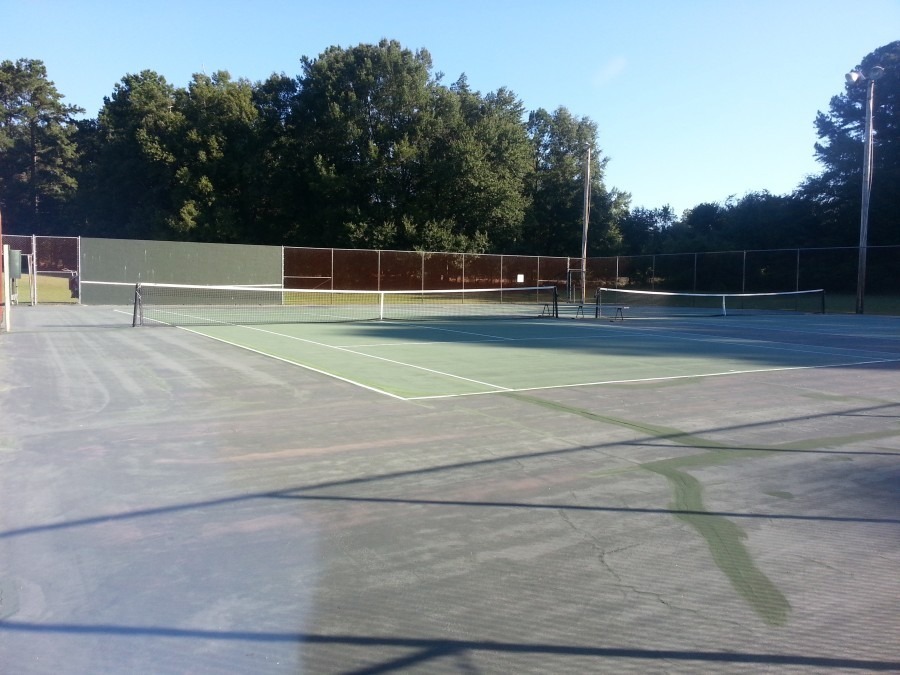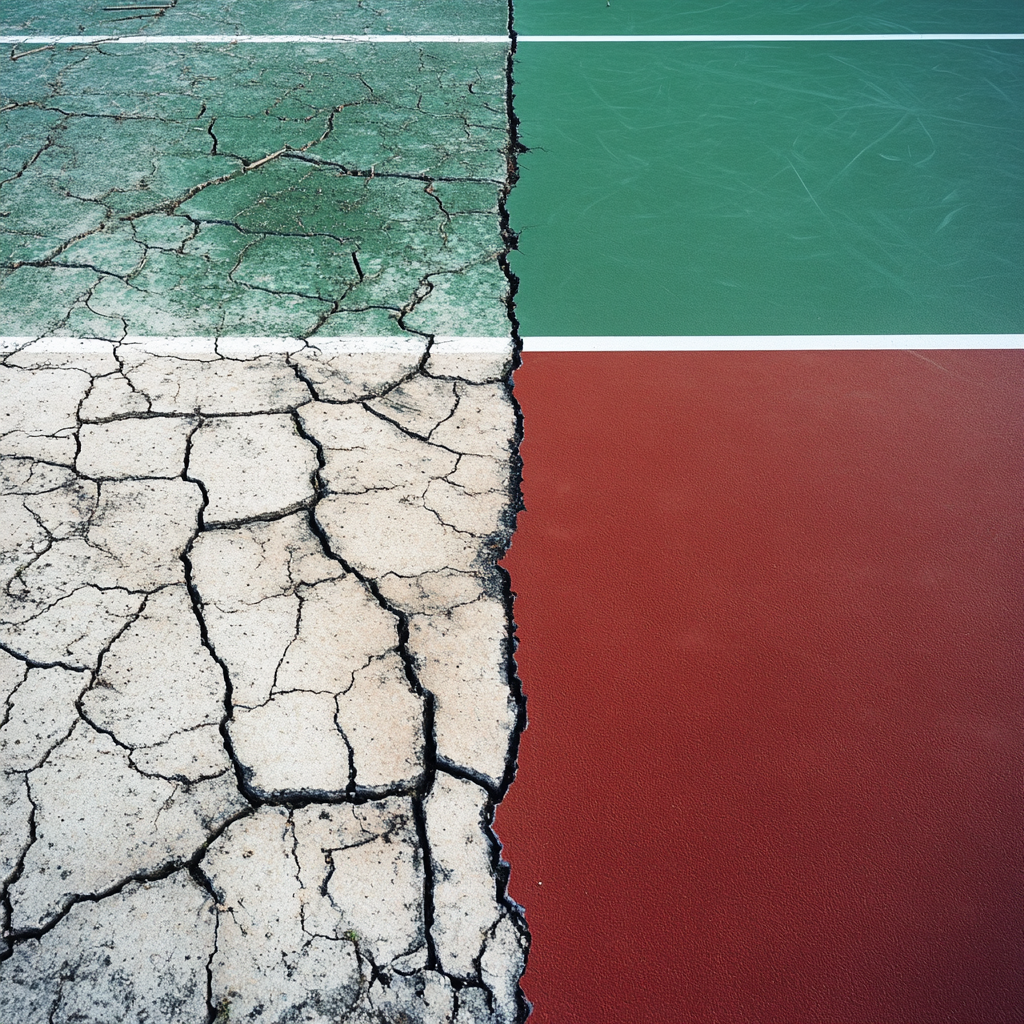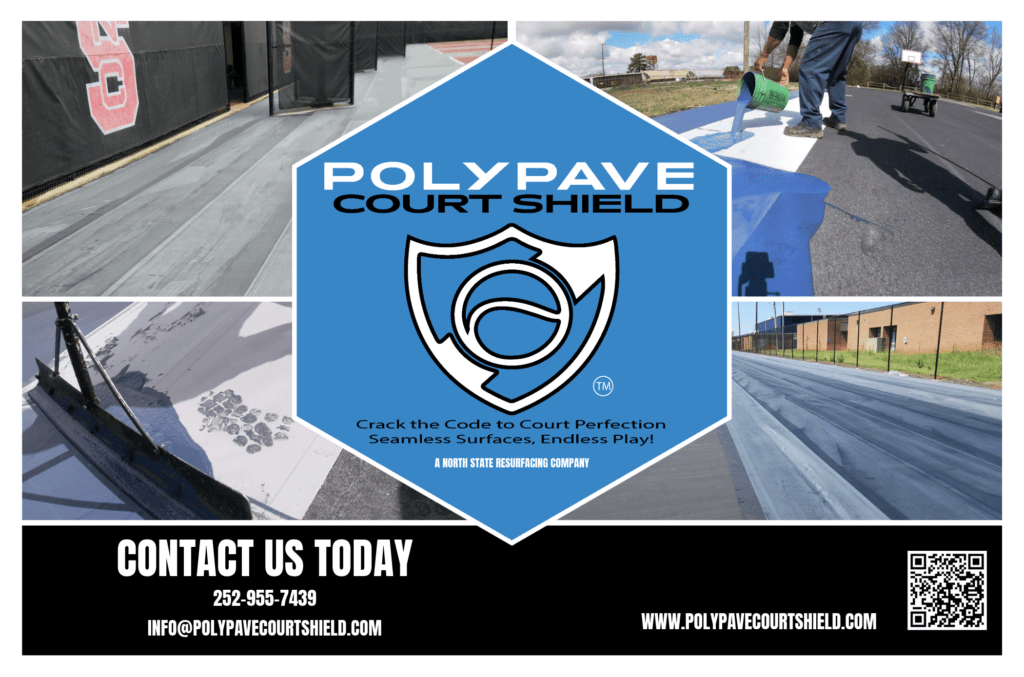Cracks in athletic courts such as tennis, pickleball, and basketball courts, can disrupt play and pose safety hazards. Recreational court cracks often arise from environmental factors, heavy use, or poor maintenance. To maintain optimal performance and extend the lifespan of your tennis court surface, effective crack prevention is crucial.
At North State Resurfacing, we understand the importance of a smooth, crack-free surface. That’s why we’re excited to introduce Polypave Court Shield, an innovative solution designed specifically for tennis court crack prevention and the prevention of cracks in all asphalt courts. With Polypave Court Shield, you can ensure your courts remain in top condition, enhancing both safety and playability.
Join us as we explore everything you need to know about keeping your tennis court or other athletic court crack-free.
Understanding Asphalt Courts for Sport Gameplay
Asphalt courts are a widely used surface for outdoor sports, including tennis, basketball, and pickleball, due to their resilience and practicality. Understanding how asphalt impacts gameplay can help optimize performance and longevity of the court.
Surface Characteristics
Asphalt courts provide a relatively smooth and consistent playing surface. This characteristic is crucial for sports like tennis and basketball, where the quality of the surface affects ball bounce, player movement, and overall gameplay. The hardness of asphalt provides a predictable bounce, which is important for precision and control in sports. However, its rigidity can also lead to higher impact on players’ joints, especially during high-intensity play.
Impact of Weather
Asphalt athletic courts are designed to withstand various weather conditions, but they can be affected by extreme temperatures and moisture. In hot climates, asphalt can become soft, leading to a change in ball behavior and increased surface wear. Conversely, cold temperatures can cause the asphalt to become brittle and break or crack. In most cases, regular maintenance and timely repairs are essential to address these weather-related challenges and ensure consistent gameplay.
Durability and Maintenance
The durability of asphalt tennis courts makes them a cost-effective choice for many facilities. However, regular maintenance is required to address wear and prevent issues like cracks and surface erosion. Without proper upkeep, the performance of the court can degrade, affecting the quality of play and safety. Sealing the surface periodically and addressing cracks promptly can help extend the lifespan of the court and maintain its playing characteristics.
Player Experience
For players of outdoor tennis, pickleball, or basketball, the quality of the asphalt surface can influence their overall experience. A well-maintained asphalt court provides a uniform playing area that supports fair play and reduces the risk of injuries. Smooth, crack-free surfaces allow for better ball control and consistent bounce, which are crucial for competitive and recreational play alike.
What Causes Cracks on Tennis Courts?
Cracks on tennis courts, pickleball courts, basketball courts, and multi-use athletic courts can arise from various factors, each impacting the court’s surface and overall playability. Understanding these causes is key to effective prevention and maintenance.
Environmental Factors
Weather conditions play a significant role in the formation of cracks. Extreme temperatures, both hot and cold, cause the asphalt to expand and contract. This repeated thermal cycling can weaken the surface and lead to cracking. Additionally, rain and humidity can erode the court’s surface, further exacerbating the problem.

Poor Installation Practices
The quality of construction and installation significantly affects the durability of a tennis court surface. Inadequate surface preparation, improper asphalt mix, or insufficient base layers can result in a weak foundation. Without a solid base, the surface is more prone to cracking under stress or heavy use.
Heavy Foot Traffic
Frequent use of the tennis court can contribute to wear and tear. The pressure exerted by players’ foot traffic, combined with the impact from tennis equipment, can cause surface degradation over time. This wear can accelerate the formation of cracks if not addressed with proper maintenance.
Structural Issues
Underlying structural problems, such as shifting soil or inadequate drainage systems, can cause the court surface to crack. If the sub-base or drainage system is compromised, it can lead to uneven settling and stress on the surface, resulting in cracks.
Lack of Regular Maintenance
Neglecting routine maintenance can lead to the gradual deterioration of the court, leading to a cracked surface. Without regular inspections and timely repairs, small issues can escalate into significant cracks. Regular upkeep, including cleaning and sealing, is essential to preserve the court’s integrity.
Tennis and Pickleball Court Crack Prevention
Crack prevention is crucial for maintaining the quality and safety of tennis, pickleball, and basketball courts. These surfaces endure significant stress from both environmental factors and regular use, making them susceptible to cracks. Implementing effective crack prevention measures ensures a smoother, safer playing experience and extends the lifespan of your courts.
Regular Inspection and Maintenance
Routine inspections are essential for identifying early signs of wear and potential cracking issues. By regularly checking the surface for minor damage and addressing it promptly, you can prevent small problems from escalating into larger, more costly issues. Routine maintenance tasks, such as cleaning and sealing, help protect the court from environmental damage and keep it in optimal condition.
Proper Installation Techniques
The foundation of a durable tennis or pickleball court begins with proper installation. Ensuring that the base layer is well-prepared and adequately compacted is critical for the court’s longevity. An even, stable base helps distribute weight evenly and reduces the risk of cracks developing over time. Using high-quality asphalt that is properly installed is vital in tennis court crack prevention.
Addressing Climate Conditions
Weather conditions can significantly impact the condition of your courts. Extreme temperatures, whether hot or cold, can cause the asphalt to expand and contract, leading to cracks. To mitigate these effects, consider applying protective coatings or sealants that offer additional resilience against temperature fluctuations. Effective drainage systems also play a crucial role in preventing water damage and erosion.
Utilizing Crack Prevention Products
Advanced products like Polypave Court Shield offer innovative solutions for crack prevention. This patent-pending polymer pavement technology is designed to provide superior protection against cracks, enhancing the durability of the court surface. By applying Polypave Court Shield, you can create a robust barrier that helps prevent the formation of cracks and prolongs the life of your court.
Professional Court Resurfacing
Professional court resurfacing is a crucial step in preventing cracks and ensuring the long-term durability of your athletic court. By applying a new surface layer of high-quality material, experienced professionals can address existing surface issues and create a smooth, resilient foundation. This process not only fills in minor cracks but also enhances the court’s ability to withstand environmental stresses and heavy use. With expert resurfacing, you can significantly reduce the risk of future cracks, maintain optimal playing conditions, and extend the lifespan of your court, providing a reliable surface for athletes to enjoy.
How to Repair Tennis Court Cracks
Cracks in asphalt tennis courts can affect gameplay and safety, making prompt and effective repair essential. Here’s a guide on how to address and repair these cracks to ensure a smooth, functional playing surface:
- Assess the Damage: Inspect cracks for size, depth, and location, and determine the appropriate repair method.
- Clean the Cracks: Remove debris, dirt, and loose material. You can use a wire brush, vacuum, or pressure washer. Ensure the crack is dry before proceeding.
- Apply Crack Filler: Choose a high-quality asphalt crack filler or sealant, and pour the filler into the crack and smooth with a trowel. Overfill slightly to account for settling.
- Smooth and Level: Use a trowel or putty knife to achieve a smooth finish, and apply a finishing compound for larger repairs.
- Seal the Surface: Apply an asphalt sealant to protect the entire athletic court. Use a squeegee or roller for even coverage.

Polypave Court Shield for Court Surfaces
Polypave Court Shield is a revolutionary crack prevention solution crafted for new concrete and asphalt sports courts. This patent-pending technology creates a robust protective layer over the entire court surface, proactively addressing the potential for cracks and reducing the need for future repairs.
With Polypave Court Shield, you invest in long-term durability and superior court performance right from the start.

Innovative Crack Prevention
Polypave Court Shield represents a major advancement in preventing cracks before they even start. Developed after a decade of thorough research and testing, this system applies a specialized protective coating that enhances the court’s ability to resist cracks. Unlike traditional methods, which only address cracks after they appear, Polypave Court Shield works from the beginning to prevent issues, ensuring a consistently smooth playing surface.
Enhanced Longevity and Performance
This state-of-the-art product not only fortifies the court surface but also improves its overall longevity and performance. By incorporating the latest in material technology, Polypave Court Shield strengthens the court’s resistance to environmental wear and intensive use. This enhancement maintains a high-quality playing surface, contributing to a better experience for players and reducing long-term maintenance needs.
Efficient and Cost-Effective Solution
Polypave Court Shield is a practical and economical choice compared to traditional crack prevention methods, such as post-tensioned concrete. Its straightforward application process on new asphalt surfaces saves time and effort. Additionally, the option to become a certified installer comes with benefits, including on-site training to facilitate efficient application and maximize the product’s effectiveness.
Crack Prevention FAQs
-
Is standing water bad for my outdoor recreational court?
Yes, standing water is harmful to outdoor recreational tennis courts. It can cause surface damage, weaken the structure, and create safety hazards by making the court slippery. Proper drainage and prompt removal of water are essential to maintain the court’s condition and ensure player safety.
-
How do I fix cracks on recreational courts?
To repair cracks on your tennis court, pickleball court, or basketball court start by cleaning the cracks thoroughly to remove debris and dirt. Next, use a wire brush or vacuum to ensure the crack is clean and dry. Apply a high-quality crack filler designed for asphalt surfaces, smooth it out with a trowel, and allow it to cure according to the manufacturer’s instructions. For extensive damage, consider professional court resurfacing or care prevention services.
-
What are the benefits of using Polypave Court Shield?
Polypave Court Shield offers several advantages for maintaining asphalt sports courts. Here’s why it stands out:
- Seamless Coverage: Provides comprehensive protection across the entire court, eliminating the risk of cracks.
- Advanced Technology: Utilizes cutting-edge materials to deliver superior crack resistance.
- Cost Efficiency: More affordable and less labor-intensive compared to conventional crack prevention solutions.
- Ease of Application: Easily applied to new asphalt surfaces, with training available for new installers.
- Enhanced Surface Quality: Maintains a high-quality playing surface, ensuring a better experience for athletes.
- Long-Term Durability: Extends the lifespan of your court, reducing the frequency and cost of repairs.
-
Can Polypave Court Shield be applied to existing asphalt courts?
Polypave Court Shield is designed for use on new courts. For existing courts with cracks, it is best to repair those cracks first before applying the product to ensure optimal adhesion and effectiveness.
-
Can I use Polypave on a concrete slab surface?
Polypave Court Shield is specifically designed for use on asphalt surfaces. For concrete slab surfaces, it’s best to consult with the manufacturer or a professional to determine the most suitable product and application method.
-
How does Polypave Court Shield prevent cracks?
Polypave Court Shield creates a protective layer that reinforces the entire court surface, preventing cracks from forming. By applying this product to new asphalt tennis courts, it provides comprehensive coverage that addresses potential weaknesses before they develop into visible cracks.
-
How often should I inspect my athletic court for cracks?
Regular inspections are recommended at least twice a year, ideally in the spring and fall. Frequent checks help identify and address any issues early, preventing minor cracks from becoming more serious problems.
-
Can crack prevention products be used on all types of sports courts?
Yes, many crack prevention products, including Polypave Court Shield, are designed to be used on various types of sports courts, including tennis, pickleball, and basketball courts. Ensure the product is compatible with your specific court surface and follow the manufacturer’s guidelines for optimal results.
-
How long does Polypave Court Shield last after application?
Polypave Court Shield is designed to provide long-lasting protection. When applied correctly, it can extend the lifespan of your court surface significantly, minimizing the need for frequent repairs and maintenance.
Contact Our Tennis Court Repair Experts Today
Ready to keep your tennis court in top shape? Reach out to our expert team today and take the first step towards a smoother, safer playing surface. Whether you need immediate repairs or want to discuss preventative solutions, we’re here to help.
Contact us now to schedule your consultation and discover how North State Resurfacing can enhance your court’s performance and longevity. Don’t wait—ensure your court is always match-ready by calling us at (919) 365-7500 or filling out our easy-to-use form below to get started.
